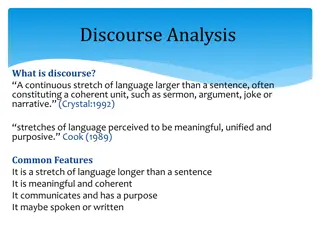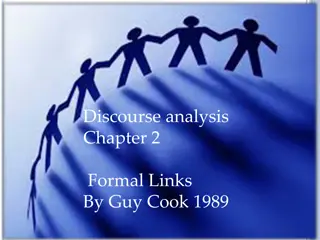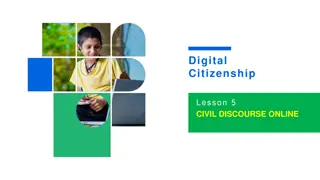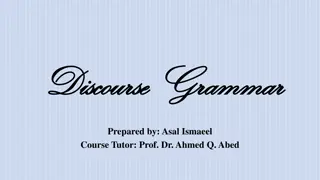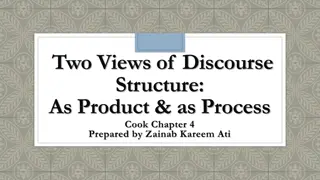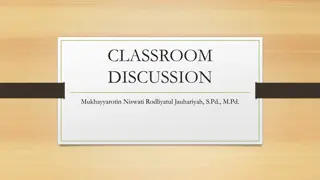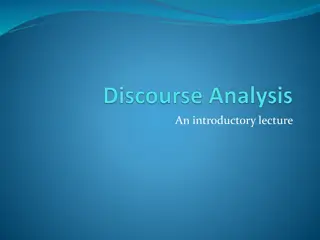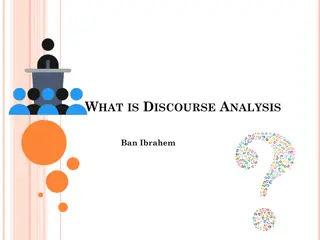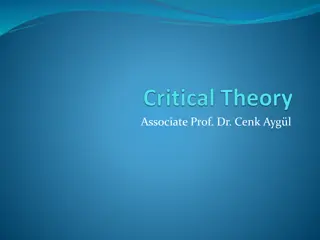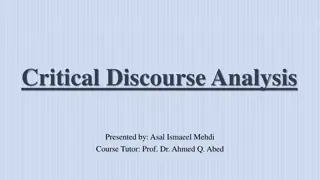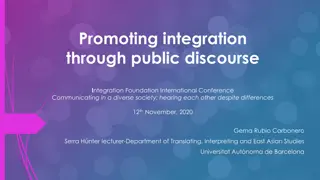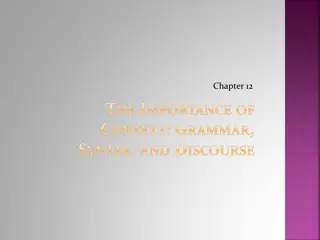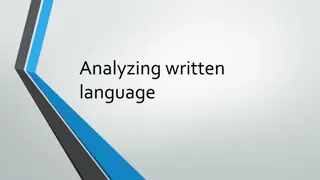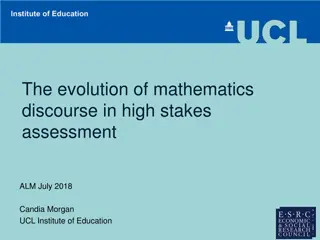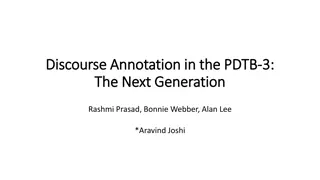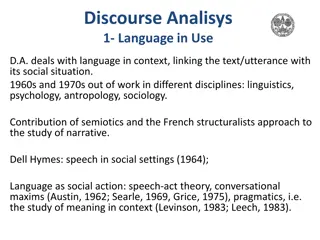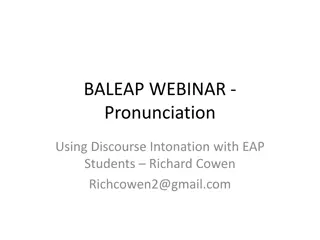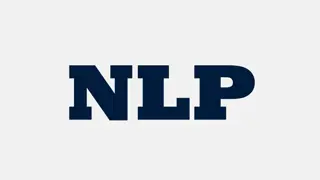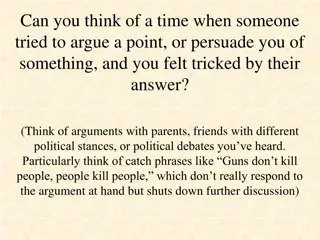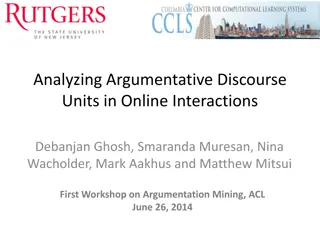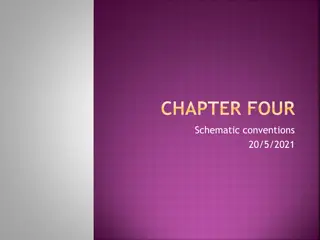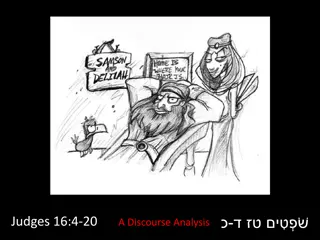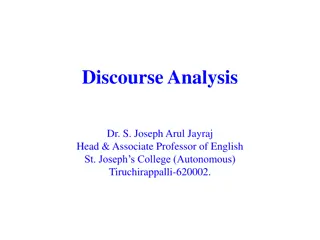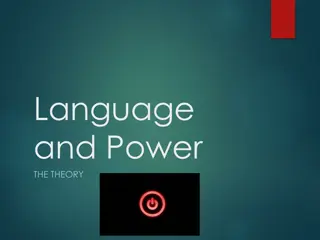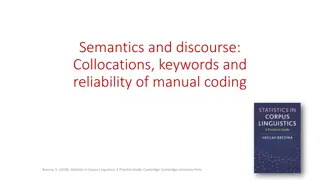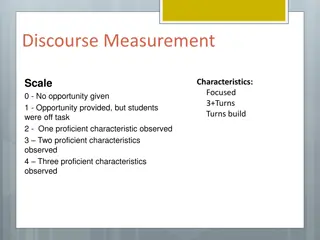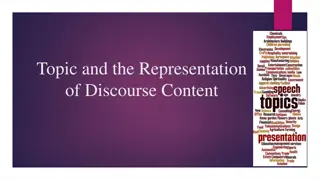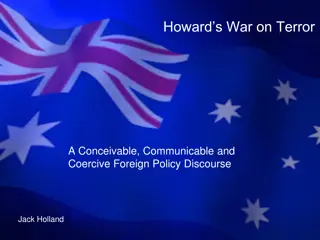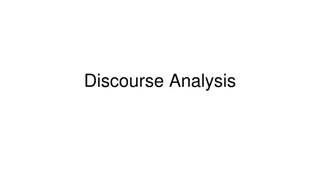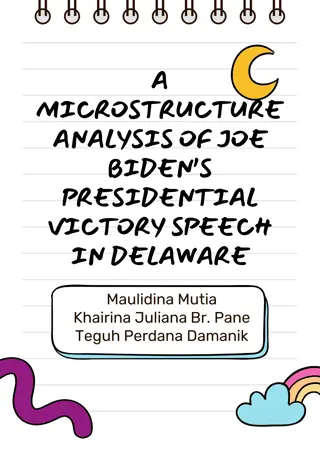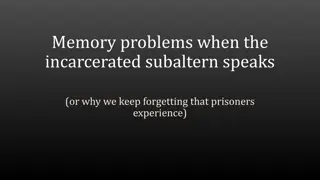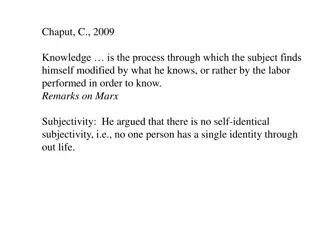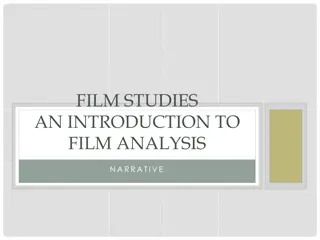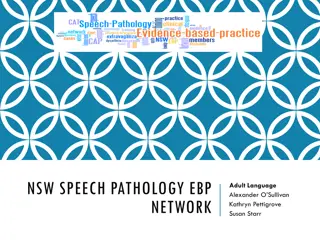Importance of Context in Discourse Analysis
Understanding context is crucial in discourse analysis as it helps interpret the meaning of words based on physical, social, and psychological factors, as well as the temporal and spatial dimensions of communication. Three key types of context include situational, background knowledge, and co-textua
1 views • 12 slides
Evolution of Mathematical Theories and Proof Systems
Development of mathematical theories such as model theory, proof theory, set theory, recursion theory, and computational complexity is discussed, starting from historical perspectives with Dedekind and Peano to Godel's theorems, recursion theory's golden age in the 1930s, and advancements in proof t
1 views • 29 slides
Understanding Discourse Analysis: Language in Context
Discourse analysis involves examining larger language units beyond sentences, such as conversations, lectures, and written texts, to understand their coherent meaning and purpose within specific contexts. Emerging in the 1970s, this field shifts focus from idealized language structures to the intera
1 views • 47 slides
Understanding Discourse Analysis: Formal Links and Contextual Connections
Discourse analysis involves examining language beyond grammar rules, focusing on formal links within sentences and contextual connections outside of language. Guy Cook discusses how formal features shape discourse meaning and how verb forms influence sentence coherence. The use of parallelism in spe
2 views • 22 slides
Civil Discourse Online in Digital Citizenship Lesson 5
This lesson focuses on civil discourse online through a class debate about whether there should be homework assignments in school. Students engage in a structured Twitter debate, showcasing pros and cons in a respectful manner. Reflections on the debate encourage understanding differing viewpoints a
2 views • 10 slides
Understanding Grammar in Discourse: A Comprehensive Analysis
Recent discourse-based perspectives on grammar discuss how linguistic items exhibit diverse patterns when analyzed within longer texts. Scholars like Hughes, McCarthy, Halliday, and Hassan emphasize the cohesion and unity of texture in text through grammar and vocabulary patterns, connecting meaning
1 views • 34 slides
Understanding the Theory of Firms: Neoclassical vs. Modern Approaches
The theory of firms is explored through the Neoclassical and Modern perspectives. Neoclassical theory focuses on profit maximization, while Modern theory delves into managerial, principal-agent, and transaction cost theories. The discussion covers criticisms of Neoclassical theory and the essential
1 views • 79 slides
Understanding Discourse Structure in Linguistics
Pragmatics explores the relationship between language and the world, while discourse is seen as an interactive totality. Rank structures, as in linguistics, help analyze the grammar of sentences. The Birmingham School of Discourse Analysis pioneered influential studies in this field, focusing on sch
1 views • 29 slides
Enhancing Learning Through Classroom Discussions
Classroom discussions play a vital role in improving students' conceptual understanding, communication skills, and thinking processes. By engaging students in active discourse, teachers can foster an environment that encourages critical thinking, idea expression, and effective communication. The fiv
1 views • 19 slides
Understanding Discourse Analysis: An Overview
Discourse analysis is the study of language in use within its social context. It involves analyzing written or spoken language to understand how it is employed in real-life situations. This research method focuses on the purposes and effects of language, cultural conventions, communication of values
2 views • 22 slides
Evolution of Light Theory: From Wave Theory to Quantum Theory
At the turn of the century, the discovery of the photoelectric effect challenged the wave theory of light, leading to the development of the quantum theory by Max Planck and Albert Einstein. This new theory introduced the concept of discrete energy units known as quanta, bridging the gap between wav
1 views • 62 slides
Understanding Discourse Analysis: Origins and Definitions
Discourse analysis, a method for analyzing connected speech or writing, was first coined by Zelling Harris in 1952. The term "discourse" has varied meanings and has its roots in Latin. It encompasses extended language units that have unity and purpose. Discourse is one of the four language systems a
0 views • 11 slides
Understanding Critical Theory in International Relations: A Deep Dive
Critical theory in IR since the mid-1980s challenges traditional views by emphasizing culture, ideology, and societal structures over objective truths. This approach questions the relationship between theory and practice, highlighting issues of inequality beyond just class, including race, ethnicity
0 views • 9 slides
Introduction to Critical Discourse Analysis (CDA)
Critical Discourse Analysis (CDA) is the study of language use in social contexts, integrating social theories with discourse analysis methods. Originating in the 1970s as Critical Linguistics (CL), CDA evolved to focus on how language reflects and shapes social meaning. The relationship between CL
0 views • 32 slides
Promoting Integration Through Public Discourse: International Conference Insights
Public discourse plays a crucial role in shaping societal perceptions of diversity and integration. The Integration Foundation International Conference delved into communicative practices that both promote and hinder integration, emphasizing the responsibility of public communicators in constructing
6 views • 15 slides
Exploring Critical Theory Through Literary Criticism and Analogy
Delve into the realm of critical theory through literary criticism, using the analogy of different perspectives on seeing an orange to understand the various facets of analysis like reader response, Marxist/social power, feminist/gender, and psychoanalytic criticism. Discover how critical theory hel
0 views • 9 slides
Understanding Grammar, Syntax, and Discourse in Biblical Texts
Explore the significance of context in analyzing grammar, syntax, and discourse in biblical Greek and Hebrew texts. Learn about the foundational elements, word order, Greek syntax basics, and the importance of discourse analysis. Delve into the definitions of grammar, syntax, and discourse, and unde
1 views • 30 slides
Understanding Discourse Analysis: Exploring Language & Power
Delve into the world of discourse analysis to uncover the intricate connections between written language, social contexts, and power dynamics. Explore topics such as text and discourse analysis, critical discourse analysis, and the impact of unequal power relations on communication.
0 views • 30 slides
Evolution of Mathematics Discourse in High Stakes Assessment
This study explores changes in school mathematics discourse over the past three decades in England through high stakes GCSE examinations. It analyzes the impact of these changes on classroom practices and student mathematical engagement, emphasizing the role of language in shaping mathematical exper
0 views • 50 slides
Understanding Discourse Coherence and Annotation in PDTB
NLP research on discourse coherence explores relations between events and propositions expressed in text, with a focus on combining individual relations into complex coherence structures. The PDTB approach annotates low-level relations in corpora to derive emergent high-level structural representati
0 views • 40 slides
Understanding Discourse Analysis: Language in Social Contexts
Delve into the realm of discourse analysis focusing on the connection between language usage and social settings from the perspectives of linguistics, psychology, anthropology, and sociology. Explore the works of key figures like Dell Hymes, M.A.K. Halliday, and the contributions of semiotics and Fr
0 views • 40 slides
Understanding Discourse Intonation in English Language Teaching
Discourse Intonation (DI) in English language teaching focuses on the significance of intonation in conveying meaning within spoken discourse. It involves key components such as prominence, tone, key, and termination. DI can help students and teachers by providing a framework for analyzing intonatio
0 views • 11 slides
Analyzing Discourse Structures in Natural Language Processing
This content explores various aspects of NLP including discourse analysis, parsing, rhetorical relations, and argumentative zoning. It delves into understanding text structures, relationships, and the use of different rhetorical devices. Examples and illustrations are provided to aid comprehension a
0 views • 8 slides
Understanding Demagoguery and Polarization in Public Discourse
Demagoguery in public discourse polarizes by simplifying complex issues into binary choices, encouraging ingroup/outgroup thinking and scapegoating. Motivism dismisses rational reasons for actions, attributing them to dark motives. Scapegoating projects responsibility onto outgroups, dehumanizing th
0 views • 18 slides
Analyzing Argumentative Discourse Units in Online Interactions Workshop
This workshop delves into the analysis of argumentative discourse units in online interactions, emphasizing the segmentation, classification, and relation identification processes. It discusses challenges in annotation and proposes a two-tiered annotation scheme involving expert annotators and novic
0 views • 59 slides
Understanding Schema Theory: A Guide to Mental Representations
Schema theory in social science refers to the mental structures individuals use to organize knowledge and guide cognitive processes. This theory, prevalent in the 1980s, aids in interpreting and predicting the world by categorizing objects and events based on common elements. Schema theory in lingui
0 views • 20 slides
Discourse Analysis of Judges 16:4-20 in the Book of Judges
This discourse analysis delves into the narrative structure and linguistic features of Judges 16:4-20 from the historical and hortatory discourse found in the biblical text. The analysis explores the usage of various verb forms, transitions, and narrative genres to uncover deeper insights into the t
0 views • 45 slides
Theories of Interest in Microeconomics II
Explore various theories of interest in economics, including the Classical Theory, Liquidity Preference Theory by Keynes, Productivity Theory, Abstinence Theory, Time-Preference Theory, Fisher's Time Preference Theory, and the Loanable Fund Theory. These theories offer different perspectives on the
0 views • 6 slides
Understanding Discourse Analysis: A Comprehensive Overview
Discourse analysis involves the study of language usage in different contexts, encompassing various aspects such as applied linguistics, rhetoric, and pragmatics. It aims to uncover how meanings are created, challenged, and changed through communication. By analyzing discourse, we can gain insights
0 views • 41 slides
Exploring Language, Power, and Influence in Discourse
This comprehensive content delves into various theories and concepts related to language, power, and discourse, covering topics such as instrumental vs. influential power, discourse analysis, and the role of humor and politeness in communication. It discusses how language is used to convey authority
0 views • 13 slides
Statistical Analysis of Discourse in Corpus Linguistics
Statistical analysis plays a crucial role in understanding the complexities of discourse in corpus linguistics. This involves exploring collocations, keywords, and the reliability of manual coding in linguistic research. The relationship between the fluid nature of discourse and the rigour expected
0 views • 21 slides
Effective Practices for Mathematics Discourse
Utilize the practices of Anticipating, Monitoring, Selecting, Sequencing, and Connecting to improve student engagement and learning outcomes in mathematical discourse. These strategies enable teachers to guide discussions effectively, address student needs, and promote mathematical understanding. By
0 views • 21 slides
Understanding Discourse Analysis and Topic Representation
Discourse analysis involves studying fragments of conversations and deciding on their boundaries. Identifying these boundaries can be explicit or implicit, using markers like formulaic expressions or intuitive notions. The notion of topic serves as a unifying principle in discourse, helping differen
0 views • 28 slides
Australia's Foreign Policy Discourse in Howard's War on Terror
Australian foreign policy under Howard's leadership during the War on Terror was shaped by a unique language and discourse that made it conceivable, communicable, and coercive. The narrative explores the contextual background, theoretical framing, and response to events like 9/11 and Afghanistan, em
0 views • 11 slides
Understanding Discourse Analysis and Its Components
Discourse analysis focuses on linguistic units beyond single utterances, exploring the structure and coherence of spoken or written language. This analysis delves into defining discourse, providing examples, and discussing the criteria for qualifying a text as discourse. Through cohesion, coherence,
0 views • 15 slides
Analysis of Joe Biden's Presidential Victory Speech Microstructure in Delaware
Focused on critical discourse analysis of Joe Biden's victory speech in Delaware, this study applies qualitative research methods using van Dijk Critical Discourse Theory. The analysis reveals elements of microstructure in the speech, emphasizing linguistic aspects such as semantic, syntactic, styli
0 views • 14 slides
Perspectives on Disremembering Prisoner Experiences in Academic Discourse
Exploring the overlooked narratives of incarcerated individuals, this collection of scholarly insights delves into the challenges faced by prisoners in having their experiences acknowledged and validated. Reflecting on works by Spivak, Code, Foucault, Kolodny, Fraser, and Young, the discourse emphas
0 views • 27 slides
Understanding Knowledge Formation and Power Relations in Foucault's Discourse Theory
Knowledge formation and power relations are intricately interconnected in Foucault's discourse theory. The process of knowledge acquisition shapes individual subjectivities, while institutions normalize these subjectivities through societal practices. Foucault explores the archeology of discourse, g
0 views • 13 slides
Exploring Narrative in Film Studies: An Introduction to Film Analysis
Shots in film and television are crucial in storytelling, forming the narrative that can be dissected into plot and discourse. The plot revolves around events and character development, while discourse focuses on how the story is conveyed. Narrative theory, highlighted by Propp's character roles, pr
0 views • 11 slides
Evidence-Based Practices in Discourse Treatments for Aphasia
This research review explores the effectiveness of discourse treatments for aphasia, focusing on improvements in discourse that lead to better outcomes for individuals with aphasia. Various treatment techniques and outcome measures are discussed, highlighting the potential benefits of specific inter
0 views • 14 slides


